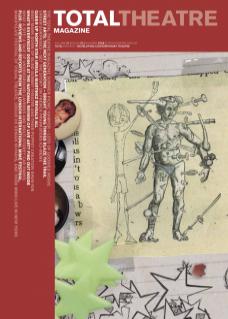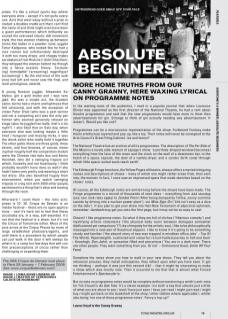In the waiting-room of the podiatrist, I read in a popular journal that when Laurence Olivier was appointed as the first director of the National Theatre, he had a rant about theatre programmes and said that the new programmes would have more to them than advertisements for gin. Strange to think of gin actually needing any advertisement. It doesn’t. Would you like one?
Programmes can be a microcosmic representation of the show. Forkbeard Fantasy make theirs artefactual, layered and pop-up, like a toy. Their notes will never be consigned to the Arts Council’s Great Filing Cabinet. Ice and lemon?
The National Theatre has an archive of all its programmes. The description of The Far Side of The Moon is a lovely aide-memoir of Lepage’s show: ‘a porthole-shaped window [becomes] everything from the face of the moon and the clock on the wall of a downtown bar, to the hatch of a space capsule, the door of a tumble-dryer, and a cosmic birth canal through which little space-suited souls reach earth’.
The Edinburgh Fringe brochure, the Yellow Pages of theatre, always offers a myriad of intriguing names and descriptions of shows – many of which one might rather erase from, than etch into, the memoir. In fact, I once saw an improvised opera that made sketches based on the shows’ notes.
Of course, all the Edinburgh notes are written long before the shows have been made. The Fringe programme is a record of thousands of neat ideas – everything from AAA standup (yes, taxi rank rules apply) to Zombie Prom (‘After being dumped by Toffee, Jonny commits suicide by driving into a nuclear power plant’), via Miss Sign-On (‘Life isn’t easy as a diva on the dole’). If you plan to get your show into that New Testament of adjectival optimism, remember: Aardvark may get you onto the first page, but it may not be so easy to cast.
Cheers! I like programme notes. So what if they are full of cliches (‘Hilarious comedy’) and mystifying artistic statements (‘the physical body veers between dialogues somewhat disillusioned yet compulsory’)? Like chiropody for the artistic soul, I like to be philosophically massaged into a new pair of theatrical slippers. I like to know if it’s going to be something sturdy and familiar (‘the absurd story of two men trapped in mindless office jobs’ – Top Of The World, Paperweight), cushioned and colourful (‘a lust-fuelled journey to hell and back’ – Kneehigh, Don John), or sensation-filled and precarious (‘You are in a dark room. There are other people. They want something from you. Or not.’ – Ontroerend Goed, Smile Off Your Face).
Somehow the notes show you how to walk in your new shoes. They tell you about the rehearsal process, they install anticipation, they reflect upon what you have seen. It got me thinking – perhaps it was just this second G&T – that it might be interesting to make a show which was mostly notes. Then it occurred to me that that is almost what Forced Entertainment’s Spectacular is.
But no note on programme notes would be complete without mentioning a smith’s anti-note for Tim Crouch’s An Oak Tree. It’s a clever example: it is both ‘a key that unlocks just a little of what you are about to see / read / have just seen / have just read / might just read / might buy / might put back on the bookshelf of the shop / other (delete where applicable)’, whilst also being ‘not one of those programme notes’. Fancy a top-up?

